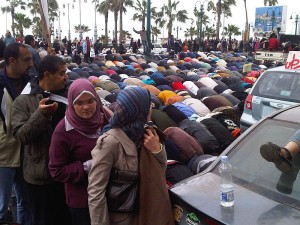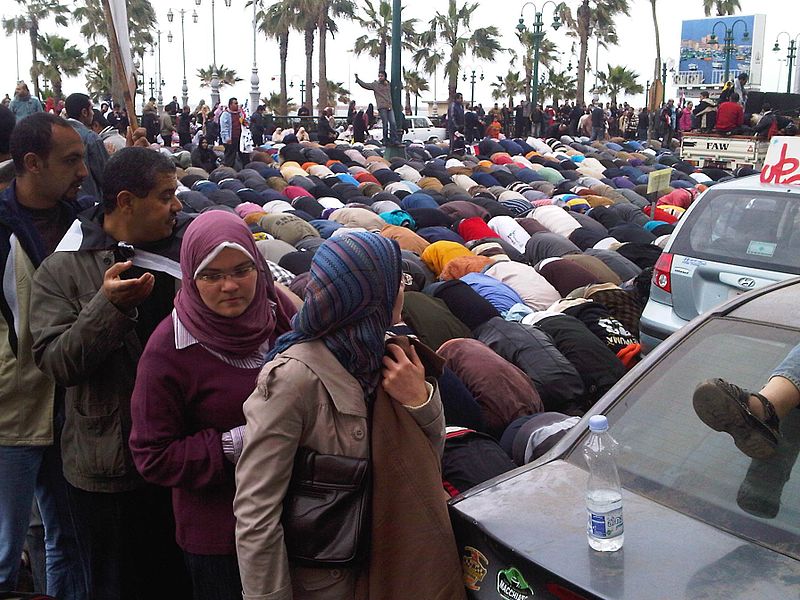 In a recent Fox News article, the American Enterprise Institute’s Michael Rubin presents an issue that will consume Middle East policy makers for decades: “Is There Really Democracy in the Middle East?” He’s apparently not interested, however, in serious analysis of that question. Instead Rubin offers a partisan polemic criticizing the Obama administration’s responses to the Arab Spring and last week’s events in Benghazi.
In a recent Fox News article, the American Enterprise Institute’s Michael Rubin presents an issue that will consume Middle East policy makers for decades: “Is There Really Democracy in the Middle East?” He’s apparently not interested, however, in serious analysis of that question. Instead Rubin offers a partisan polemic criticizing the Obama administration’s responses to the Arab Spring and last week’s events in Benghazi.
Rubin dismisses as “initial optimism” Secretary of State Clinton’s September 2011 description of a “US strategy… based on America’s experience at the end of the Cold War, helping countries that are moving to democracy.” For Rubin, the Arab Spring is far different. Last week’s violence in Benghazi was “equivalent to…Robespierre unleashing the Reign of Terror in the chaos…following the 1789 storming of the Bastille that began the French Revolution.” He argues that President Obama was annoyed “with analysts who suggested that Islamists might hijack the uprisings” and “directed his aides to discount parallels to Iran and focus instead on comparisons to Eastern European transitions after 1989” instead. He goes on to add, in a dramatic tone channeling the stentorian tones of Orson Welles, that “the Islamist putsch continues…as the Muslim Brotherhood…filled the vacuum” in Tunisia and Egypt after their respective dictators abdicated.
Unfortunately, Rubin can only offer a hardly realistic alternative. He suggests that we “ask whether democracy is even possible in the region” because Islamists will inevitably hijack it, as he states they already have in Egypt, Tunisia and Libya. And since he refers to the French Revolution more than once (but in misleading comparisons), it is appropriate to characterize Rubin’s policy preference in those terms. He seems to deny the Arabs who removed their autocratic regimes the legacy of the French Revolution that we in the West have enjoyed for two centuries. Historians define almost unanimously this legacy as including the basic rights of man and citizen, the right to free and fair elections, an end to feudalism and hereditary privileges, the equality of all men under the law, and free speech and thought.
Despite Rubin’s version of the Obama administration’s missteps, can anyone identify any Middle East policy makers in or out of government, in the US or abroad, who do not agree with Egyptian academic Saad al-Din Ibrahim — referenced by Rubin — when he says that “It’s understandable the Muslim Brotherhood won… after years in opposition they could promise constituents the world?”
Inconveniently for Rubin, we in the West bear some responsibility for the unique domestic popularity of Islamist parties within Middle Eastern nations. Rubin understands the strength of Islamists in Arab societies today but chooses pointedly to ignore the reasons for their presence. During the Cold War, the region’s autocrats attracted Western aid by suppressing the left. Autocrats promoted Islam as a domestic bulwark against leftist movements. Israel even adopted this tactic. As is commonly reported, Israel provided Hamas support to grow into an alternative to leftist Palestinian organizations. After the fall of communism, Arab autocrats maintained American support by ensuring that their domestic opposition could not interfere in negotiating peace agreements with Israel.
Rubin also complains that the Administration is “treating American aid as an entitlement for hostile regimes.” The last time I checked, Egypt, Tunisia, and Libya are not enemies of the United States. No doubt, elements within their societies are, but elements like these also exist in Eastern Europe and among other US allies. Rubin’s complaints about American financial aid “appeasing” the newly elected regimes discounts the possibility that they may truly enjoy majority support from their electorates. Moreover, the US has provided aid to foreign nations to enhance American interests for decades; it’s not charity.
Since Rubin expects any administration to ensure a continuance of American influence in the region, the Obama administration’s early support for the Arab Spring, its assistance to the Libyan Revolution and financial aid, are among the tools the US must continue to employ; “big sticks” are no longer an appropriate option. Rubin also ignores elements within these countries that can serve as US allies such as the Egyptian army and the thousands of Benghazi residents who ejected Islamist militias from the city the other day. His account of the Benghazi violence never mentions that dozens of Libyans tried to help the beleaguered diplomats.
Rubin’s main problem seems to be with Middle Eastern democracy itself. He seems truly unsettled by the results of free elections. But democracy can be messy; its initial baby steps messier still. Sometimes your friends don’t win. There is no evidence that Islamists stole the Egyptian elections. President Mohamed Morsi may have won the freest and fairest election in the country’s history. It would be much worse for the US, presuming a monopoly on democratic perfection, if it were to deny it to others. The US is fortunate as of yet to remain relatively untarnished by the West’s history of predatory and lethal activities throughout Asia, Africa, and the Middle East. Perhaps, unlike in Iran, the US can reap the wind without sowing the whirlwind.






As you point out, “Historians define almost unanimously this legacy as including the basic rights of man and citizen, the right to free and fair elections, an end to feudalism and hereditary privileges, the equality of all men under the law, and free speech and thought.” In other words, you can’t understand the rise of democratic governments throughout Western Europe without admitting that the French Revolution had benefits. Yet many American neo-liberals have to prove their bona fides with some anti-French and anti-Muslim talk. And even as the neo-liberals go on, they forget (or don’t read The Guardian) or gloss over the recent events in Hungary or the Ukraine. But then there aren’t mosques in Budapest, so democracy will spontaneously break out there–sometime. In fact, from what I’ve read lately, I hold out more hope for Tunisia than for Hungary.
Is Michael Rubin worth diminishing? If he is, you have done a masterful and devastating job.